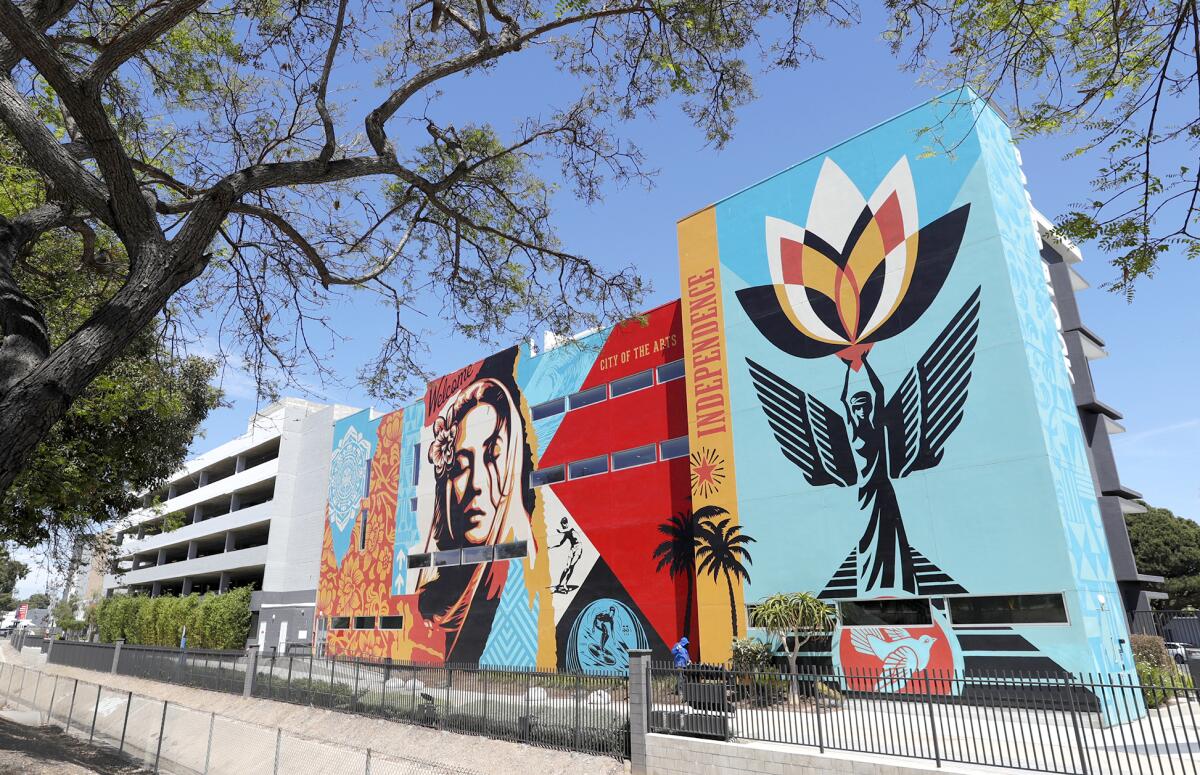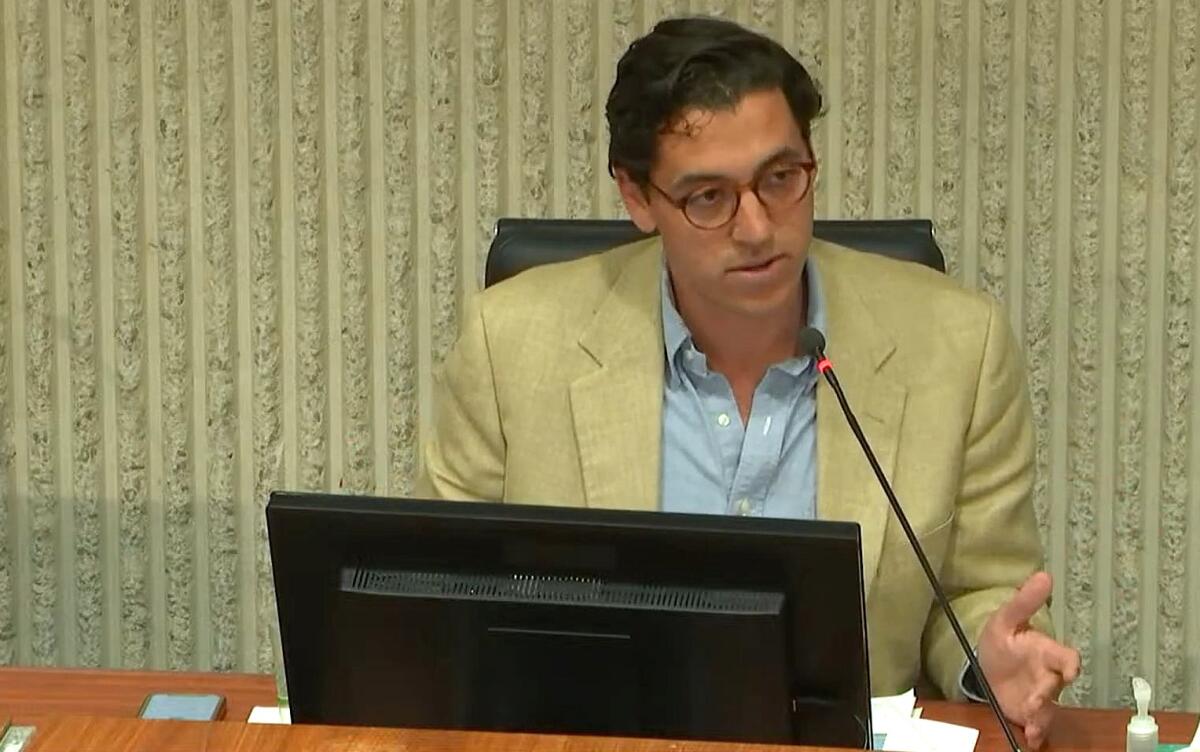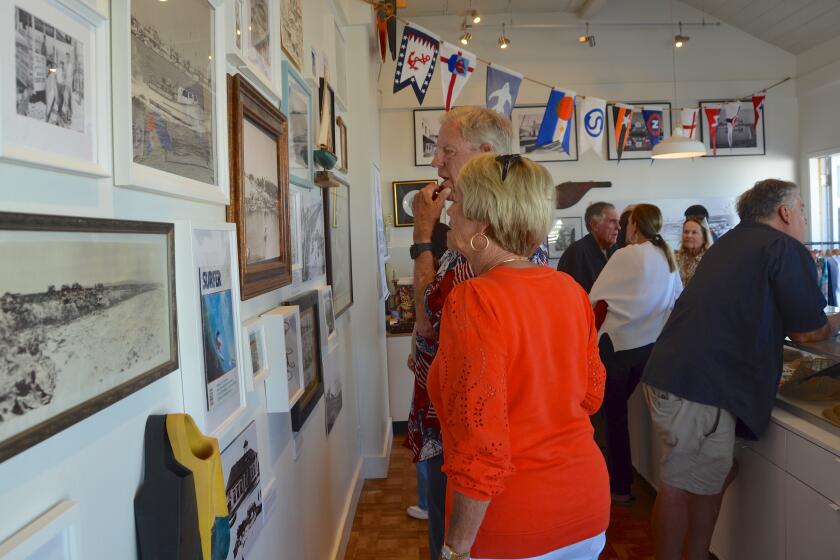Costa Mesa Arts Commission tests its power, as authority of citizen-led groups is disputed

- Share via
When a city appoints citizens to serve on municipal commissions and committees, what rights and responsibilities do those individuals have to inform policy, make recommendations to city leaders and to generally get things done?
That point is being pondered in Costa Mesa, the self-proclaimed City of the Arts, where some council members this week sought further clarity after learning about a dispute on the subject between arts commissioners and staff.
Upon reviewing the city’s arts budget during a May 1 meeting, commissioners recommended shifting $160,000 from a large-scale art installation fund to a public-private mural initiative that would support the painting of historical scenes on participating local businesses.

Vice Chair Fisher Derderian, who proposed the motion, explained it would be a more immediate way of getting eye-catching art into public places, particularly if businesses chipped in to cover a portion of the expense.
Historical murals would also be a fitting way to celebrate Costa Mesa’s rich and storied past, while positioning the city for federal arts grants aimed at honoring America250, the nation’s bisesquicentennial, in 2026, Derderian reasoned.
“We have to be ambitious. We have to have a vision that says let’s get art out there tomorrow, if at all possible,” he said at the meeting. “I don’t think there’s any reason we couldn’t at least propose this as part of the budget and then, if it gets approved, really flesh out what the idea would be.”
The move, which passed in a 4-2 vote, is more than a mere recommendation. It’s a test of the civic reach of the Arts Commission, established in 2022 to function as its own legislative body, compared to the erstwhile advisory-only Cultural Arts Committee.
The vote followed a discussion between commissioners and Director of Parks & Community Services Brian Gruner, who oversees the panel, regarding the roles and responsibilities of the group and its power to seek new funding sources and create public art programs.
Derderian asked Gruner to clarify whether the commission could form a subcommittee to discuss incorporating art in future public works projects or displaying it on city-owned buildings. Or maybe the commission could call a study session or make a motion to the City Council to hold a discussion at a higher level?
The answer was, essentially, no.
“We’d have to have a discussion and dialogue, and connect with [then-City Manager Lori Ann Farrell Harrison] first and see what the recommendation would be from her,” Gruner responded.
Costa Mesa municipal code seems to state otherwise, specifying the commission shall:
“...by its own motion, conduct studies and investigations and hold public hearings as it may deem necessary for the formulation of policies, plans and procedures relating to arts, or to determine the wisdom and efficacy of such policies, plans and procedures, or to determine an action plan to pursue in implementing the city’s arts and culture master plan and report its findings and recommendations.”
When asked about the rights described in the legislation, Gruner said he could request the city clerk hold a training session for commissioners on how to properly interpret the law.
Instead, Derderian took a different course. During a discussion on the city’s arts budget later on, he made a motion recommending $100,000 in a previously approved art-installation fund, and an additional $60,000 in the new budget cycle, be repurposed for the historical mural initiative.
The motion carried on a 4-2 vote. And, just like that, the Costa Mesa Arts Commission took a first tentative step toward independence.
Derderian said in a follow-up interview he reviewed the city’s municipal code after hearing public comments — particularly from Jim Fitzpatrick, a former planning commissioner-turned-cannabis consultant and vocal City Hall critic — indicating the commission had more power than it was being allowed to exercise.
“There’s a real question as to what we’re supposed to be doing and how we fulfill that purpose,” Derderian said Wednesday. “We’re developing precedent in trying to understand what our role is.”
Although it’s unknown whether the Costa Mesa City Council will approve the commission’s recommendation, it seems city leaders are open to exploring the power of citizen-led municipal groups.
Councilman Jeff Pettis said during a regular council meeting Tuesday commissioners should feel empowered to carry out the duties defined in the municipal code.
“I do not believe the Arts Commission is functioning to its full capacity,” Pettis said. “I’m going to be watching every minute of every Arts Commission meeting going forward to ensure they are being able to function within their role as commissioners to their highest level of authority.”
Councilman Mike Buley asked whether a council study session might be convened to clarify the responsibilities of the groups.
“We’ve got citizens donating an extensive amount of their time,” he said. “A lot of them are very skilled and knowledgeable in their specific areas, and it’s a resource we should rely upon. They should be given a citizen voice in what we do in this community.”
All the latest on Orange County from Orange County.
Get our free TimesOC newsletter.
You may occasionally receive promotional content from the Daily Pilot.




